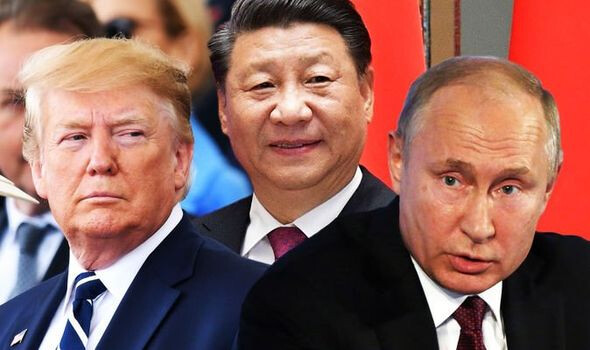
WASHINGTON D.C. – President Donald Trump's assertive foreign policies towards China and Russia are increasingly facing scrutiny, with critics arguing that they are producing outcomes contrary to their intended goals. The president's imposition of steep tariffs on Chinese goods and his conciliatory approach towards Russia are raising concerns that the United States is inadvertently weakening its international influence.
According to a recent report by The Washington Post, Trump, who has touted himself as a "great peacemaker" and negotiator, has struggled to broker peace in key conflict zones, including Gaza and Ukraine. His dual-pronged strategy towards China and Russia, marked by economic confrontation and diplomatic leniency, respectively, has yet to yield substantial results, and instead, it has created global economic uncertainty.
Global Economic Concerns Over Tariffs
As global finance leaders gathered in Washington for the International Monetary Fund (IMF) annual meetings, they voiced apprehension about the potential "significant slowdown" in global economic growth due to Trump's tariff policies. Christine Lagarde, President of the European Central Bank (ECB), expressed concerns about the "overall negative impact on GDP" resulting from the tariffs, noting that growth indicators in Europe were already showing signs of deceleration. There are also mounting fears that American consumers could soon experience sharp price increases.
The prospect of Chinese retaliation has alarmed both the American business community and high-ranking government officials. Concerns have been raised regarding the potential disruption of rare earth mineral exports, which are critical to key American industries.
"The only certainty is uncertainty," an anonymous senior Southeast Asian official told reporters, highlighting the erosion of trust in American investments due to the Trump administration's unpredictability. This official also questioned the United States' ability to forge new trade agreements with other nations.
In an apparent attempt to mitigate the escalating tensions, Treasury Secretary Steven Mnuchin signaled a willingness to ease tariffs on China, acknowledging that the current levels are "not sustainable" and hinting at a "phased reduction." However, China, sensing its growing influence over Washington, appears less inclined to compromise, while the Trump administration grapples with salvaging its strategic miscalculations.
Rick Waters, a former senior U.S. diplomat at the Carnegie Endowment for International Peace, warned in The Wall Street Journal of an "economic decoupling" between the U.S. and China, coupled with a lack of safeguards to prevent trade disputes from spilling over into other areas. "It is becoming increasingly difficult to deny that a new Cold War is emerging," he stated.
Chinese President Xi Jinping has seized this opportunity to position China as a stable champion of globalization, contrasting it with the unpredictable protectionism of the United States. Domestically, China has implemented economic stimulus measures to cushion the impact of American tariffs.
Andy Rothman, CEO of the California-based consultancy Sinolytics, commented, "The pain tolerance for what's coming is likely greater in China than in the U.S. There are too many consumer goods that the U.S. has no substitute for. Are people willing and able to pay double for their kids' shoes?"
Kurt Campbell and Rush Doshi, who served in the Biden administration's China policy team, recently cautioned in a Foreign Affairs article against the U.S. overestimating its unilateral power and underestimating China's capacity to respond, particularly during the Trump era. They advocated for a more nuanced approach to competition with China, emphasizing the judicious use of punitive measures and stronger cooperation with other nations.
Stalled Diplomacy with Russia
On the Russia front, while President Trump has generally adopted a more lenient stance, his efforts to mediate a peace agreement in Ukraine have stalled. Trump has publicly criticized Ukrainian President Volodymyr Zelensky as a "man with no cards" and has seemingly echoed Russian narratives.
Although Trump's envoy, Steve Witkoff, is scheduled to visit Moscow for discussions with high-ranking Russian officials, the concessions the White House hopes to extract from the Kremlin remain unclear. The Washington Post reported that the Trump administration's proposed peace plan includes "excluding Ukraine from NATO, recognizing Russia's illegal annexation of Crimea, and acknowledging most of the territory occupied by Russian forces."
Despite recent Russian airstrikes on Kyiv that resulted in civilian casualties, the Trump administration continues to assert that Russian President Vladimir Putin desires a ceasefire.
Sir Mark Sedwill, Chairman of Geopolitical Advisory at Rothschild & Co and former UK National Security Adviser during most of Trump's first term, remarked, "What is perplexing is that all the pressure and all the appeasement on Ukraine has actually been for Russia." He further noted, "Trump's mantra is 'Make America Great Again,' but paradoxically, he is underestimating American power. Why does he treat Putin as an equal? Putin is not an equal."
Sedwill suggested that Trump is "almost deliberately accelerating multi-polarity, as if he sees the world through a 19th-century concept of spheres of influence and accepts that American influence is more limited than it actually is."
Lingering Questions and Uncertain Future
As President Trump approaches the 100-day mark of his administration, the effectiveness of his signature foreign policy initiatives towards China and Russia remains highly questionable. The economic consequences of the trade war with China are becoming increasingly palpable, threatening global growth and potentially harming American consumers. Simultaneously, the diplomatic outreach to Russia has yet to yield any tangible progress in resolving the conflict in Ukraine, raising concerns about the potential concessions being offered at Kyiv's expense.
The emerging narrative suggests that Trump's policies, driven by a belief in unilateral action and a transactional approach to international relations, may be inadvertently undermining the very global influence he seeks to project. The coming months will be crucial in determining whether the administration can recalibrate its strategies to achieve its stated objectives or if the current trajectory will lead to a further erosion of American leadership on the world stage.
[Copyright (c) Global Economic Times. All Rights Reserved.]






























